Is Trump Going to Cut Medicaid? Unpacking the Complexities of Healthcare Reform
The question of whether Donald Trump would cut Medicaid is a complex one, steeped in political maneuvering, shifting priorities, and the ever-evolving landscape of healthcare policy. While he campaigned on repealing and replacing the Affordable Care Act (ACA), which expanded Medicaid, the reality proved far more nuanced than his pronouncements. Let's delve into the story, examining the promises, the attempts, and the ultimate outcome.
During his presidential campaign, Trump often spoke of repealing Obamacare, a move that would have indirectly impacted Medicaid. The ACA expanded Medicaid eligibility, significantly increasing the number of Americans covered under the program. Trump's rhetoric suggested a desire to dismantle this expansion, a move that worried millions relying on Medicaid for crucial healthcare services.
What were Trump's stated goals regarding Medicaid?
Trump's specific plans for Medicaid were never explicitly detailed in a single, comprehensive policy document. His approach was more characterized by a series of pronouncements and proposals that frequently shifted. He consistently advocated for market-based healthcare reforms, emphasizing state control and increased competition among private insurers. This implied a potential reduction in federal funding for Medicaid, possibly through block grants or per capita caps. The idea was to shift more responsibility to individual states, leading to varied levels of coverage and access across the nation.
Did Trump succeed in cutting Medicaid?
The short answer is: not directly, and not to the extent initially suggested. While several attempts were made to repeal and replace the ACA, which would have inevitably led to changes in Medicaid, none succeeded in passing Congress. The Republican-controlled Congress, despite repeated attempts, ultimately failed to pass legislation that would significantly alter Medicaid funding.
The administration did pursue other strategies to influence Medicaid spending. These included:
- Promoting work requirements: Several states, encouraged by the Trump administration, implemented work requirements for Medicaid recipients. The effectiveness and impact of these requirements remain a subject of ongoing debate and research. Studies showed mixed results, with some indicating a decrease in enrollment but also potential negative consequences for access to care.
- Changes to funding mechanisms: While large-scale cuts never materialized, there were minor adjustments to the federal funding formula for Medicaid. However, these adjustments were not drastic and didn't represent the major overhaul initially envisioned.
What happened to Medicaid under Trump's presidency?
Under the Trump administration, Medicaid remained a significant government program, continuing to provide health coverage to millions of Americans. While significant cuts were proposed and debated, they were never enacted into law. The program did experience changes, primarily related to state-level policy variations prompted by the administration's approach.
What are the current trends affecting Medicaid?
Following the Trump administration, the future of Medicaid remains a topic of ongoing discussion. The debate surrounding healthcare reform continues, with questions persisting about the long-term sustainability of the Medicaid program and how best to ensure access to affordable healthcare for all Americans.
In conclusion, while Trump advocated for changes that could have potentially reduced Medicaid funding and altered its structure, his attempts ultimately failed to significantly cut the program. The actual impact was more subtle, manifested in state-level initiatives and minor adjustments to funding mechanisms, rather than a sweeping overhaul. The ongoing debate about healthcare in America suggests that the future of Medicaid will continue to be a subject of intense political and social discourse.

